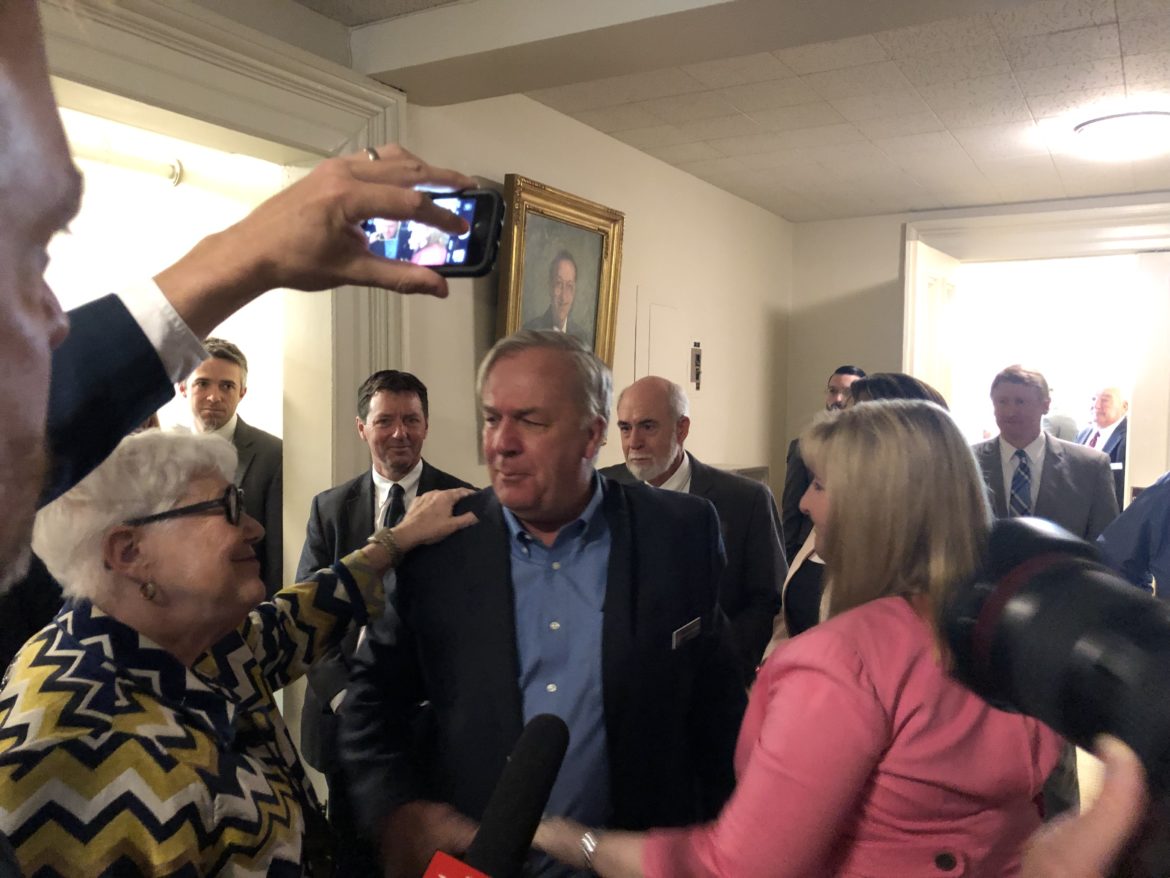By PAULA TRACY and
CATHERINE McLAUGHLIN, InDepthNH.org
CONCORD – State Rep. Renny Cushing spoke about his father’s murder at the hands of an off-duty Hampton police officer in 1988. Others talked about the need for more police training as the new Commission on Law Enforcement Accountability, Community and Transparency continued taking testimony on Thursday.
Cushing, D-Hampton, chair of the House Criminal Justice and Public Safety Committee, discussed House Bill 1645, an omnibus policing bill which is on its way to Gov. Chris Sununu’s desk.
“My father was murdered by a police officer. He was killed in our family home in front of my mother. It was carried out with a sawed-off shotgun,” Cushing said.
The next day, that officer put on his uniform, strapped on his badge and went to work, he said. While Cushing said it is a tough job, there are among police people he called “predators.”
And if you are a victim of such a predator, whose role is to serve and protect, “if you are a victim, it is very isolating and very disorienting,” Cushing said.
Robert McLaughlin Sr. was an 18-year veteran police officer when he killed Cushing’s father, Robert Cushing, as he opened the front door of his Hampton home on June 1, 1988. McLaughlin and his then-wife Susan as accomplice were both sentenced to life in prison without parole.
“It is hard to know how to get grounded,” Cushing said, noting he wondered how and who smuggled in a hack-saw blade to that officer’s cell while incarcerated. Prior to this individual becoming a law enforcement agent, he was a domestic abuser, blatant racist, and a criminal, he said.
Cushing said he is mindful there may be legislation as an outcome of the commission’s work and if re-elected, he could be part of the discussion. House Bill 1645 has several areas that include a comprehensive ban on police chokeholds, similar to that used in Minnesota that killed George Floyd, and mandatory reporting of police misconduct by other officers.
“One thing that is good about the state is we have a centralized school for all law enforcement,” said Cushing.
The state does have mandatory psychological fitness and drug testing but it contains a footnote where certain police departments can get an opt-out, he said. This bill removes that exemption, Cushing said.
Cushing said he wants to move into a discussion about people who have been victimized by law enforcement and a need to increase and improve services to those individuals.
“I am glad we have mechanisms that do a better job on screening that but I don’t want us to become complacent,” Cushing said.
Cushing asked the commission to consider what services are available to victims of law enforcement and he left them with one metric to consider:
New Hampshire, he said, spends $80 million on its university system and $120 million on its Department of Corrections.
“What is that saying about our priorities in this state?”
The commission also heard about ways to better allow for communication between those who are deaf and hard of hearing.
Members of that community urged police to have cards in their cruisers with contact information for emergency translators.
Systemic Issues
The committee spent several hours on the testimony of Martha Wyatt, a third-party training vendor, who said there are some “systemic issues” with police that the state needs to deal with.
Given the level of responsibility the police have over the public, they should have more annual in-service training than eight hours, Wyatt said.
She urged 32 hours of annual in-service training for the state’s 4,000 officers over the current eight hours and said the state could increase the average number of training hours for recruits to the national average.
Unconscious bias, Wyatt said, is an issue in the state and it needs to address on a regular basis.
Wyatt operates Community Strategies Unlimited and for three decades has been a part of the state’s law enforcement community. She has coordinated training for thousands of police officers across New England.
Wyatt said police are “regular people who sometimes are placed in extraordinary circumstances.”
Implicit bias training has been in place for more than a decade, she said, not just in recent days when calls for de-funding police have been made nationally after the death of George Floyd in Minneapolis. That incident, captured on video, sparked outrage nationally and protests in New Hampshire that led Gov. Sununu to form the commission.
Sununu charged the group with taking input and coming up with substantive plans to change and improve law enforcement accountability within 45 days.
Eddie Edwards, a member of the commission and a former police chief, said many departments have training annually within their departments including training for de-escalation.
Wyatt said there are issues in the state that cannot be overlooked, in particular hearing from some police officers who believe the death of Rayshard Brooks at the hands of Atlanta police was justified. She said she does not believe it was justified.
Wyatt also noted that it would be good to have public data released on accurate demographic/racial information related to police stops and arrests in New Hampshire.
Wyatt said at the end of the budget year in police agencies there are often funds left over, then spent quickly so the budget is not reduced in the subsequent year. Equipment is a line item that could be put off if more training is needed, she said.
The next meeting of the commission will be Tuesday from 9:30 a.m. to noon and following that July 16 from 9 a.m. to 11:30 a.m.
For more information, visit https://www.governor.nh.gov/sites/g/files/ehbemt336/files/documents/20200709-leact-meeting-notice-agenda.pdf





